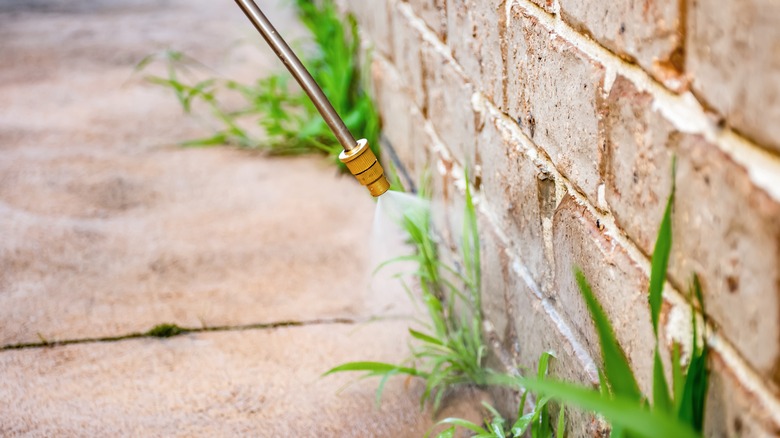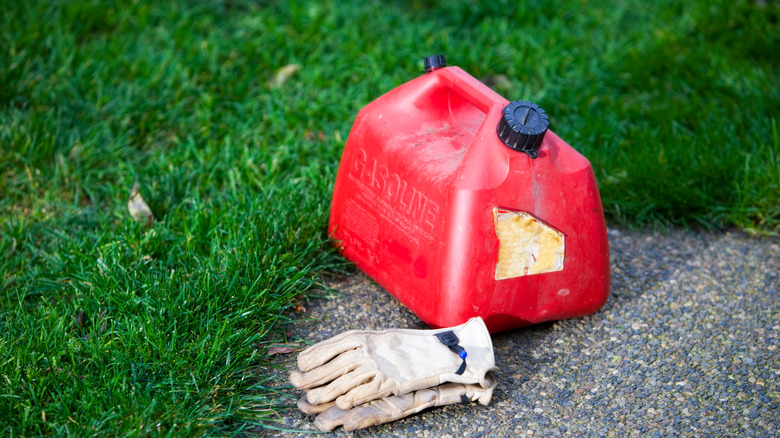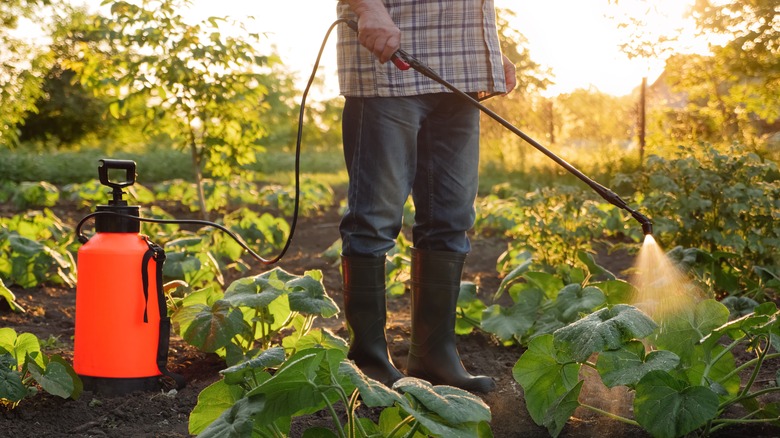Think Twice Before Using Gasoline To Kill Weeds. Here's Why
Some common garden weeds can be notoriously hard to get rid of, often driving even the most patient gardeners to consider extreme measures. Among the myriad control methods, using gasoline to kill weeds has emerged as a topic of conversation. Some advocates argue it's more effective than traditional weed killers, and this claim holds some truth. Gasoline does indeed burn the leaves of plants. However, if you're contemplating this approach, it's crucial to think twice. The allure of a quick fix can be tempting, but the reality is that, unlike traditional herbicides, gasoline fails to reach the roots. This means the weeds might come back.
On top of this, gasoline is not a selective killer. It doesn't differentiate between your beloved garden plants and those pesky weeds. Its indiscriminate nature can lead to the destruction of more than just unwanted plants, risking the health of your garden. The immediate effect might seem satisfying as the weeds wither, but the unseen damage beneath the soil's surface might be a bigger nightmare.
Gasoline's volatile and toxic characteristics extend beyond just the soil. Its application releases harmful vapors into the air, posing a risk to your health and that of any nearby wildlife. Additionally, the economic aspect cannot be overlooked. Gasoline is a costly method of weed control, especially when compared to other sustainable practices that offer longer-lasting results. The initial cost of gasoline might not seem much, but when factored into regular garden maintenance, it becomes an expensive and inefficient method.
The mechanics of using gasoline on weeds
Gasoline's effectiveness in killing weeds stems from its composition. It's packed with hydrocarbons such as alkanes and alkenes. These hydrocarbons act as solvents and are ruthless in stripping away the cell membranes of a plant. They also attack the waxy protective layer on the plant's surface. This process exposes the plant, making it highly vulnerable, and disrupts its normal growth cycle by penetrating the cells. The aftermath? The plant can't properly soak up water and nutrients from the soil, leading to a rather quick demise. You'll notice the once-vibrant leaves start to wilt before the plant gives in entirely, usually within a matter of hours.
Using gasoline to get rid of weeds demands a high level of caution. It's not your everyday gardening solution, and its application needs a careful approach. One common method is to use a sprayer, which allows you to target weeds directly. This precision helps, especially on dry days, as it reduces the chance of rain washing the gasoline into the soil or nearby waterways, where it could cause harm. Another route some might consider is mixing gasoline with herbicide, aiming to boost the weed-killing prowess of their concoction. Whether applying it directly or as part of a mixture, the decision to use gasoline as a weed control method is significant. It warrants a thoughtful, informed approach to ensure it's handled safely and responsibly.
Trusted alternatives for weed management
As mentioned, gasoline as a weed killer isn't the best solution since the environmental hazards are too significant to ignore. Thankfully, the world of gardening offers a plethora of safer, more sustainable methods for keeping those pesky weeds at bay. If you prefer a hands-on approach, manually pulling weeds ranks as a top eco-friendly technique. This method shines in its simplicity and effectiveness, especially when the soil is damp. Moisture loosens the soil, making it easier to extract weeds — roots and all. This thorough removal ensures that the weeds don't make an unwelcome comeback.
When considering chemical interventions, herbicides present a more nuanced solution. Today's market offers formulations designed to target specific weed species, reducing collateral damage to non-target plants. Careful selection and application of these herbicides, as per the guidelines provided by their manufacturers, play a crucial role in minimizing their environmental footprint. It's a balancing act — achieving weed control while stewarding the health of the surrounding ecosystem.
Mulching also stands out as a particularly effective strategy for weed suppression, without the use of chemicals. By covering the soil, mulch blocks the sunlight necessary for weed seeds to germinate. If you prefer even greener practices, the realm of organic herbicides and home remedies offers a treasure trove of options. Natural substances like vinegar or boiling water have proven their worth as effective weed killers that leave a minimal environmental imprint.


